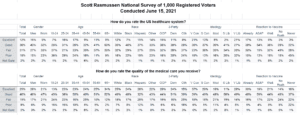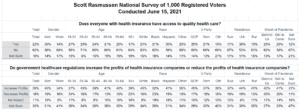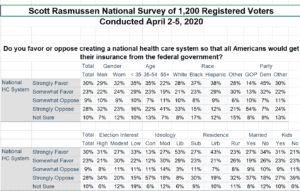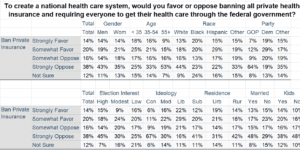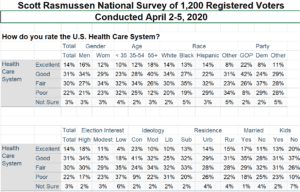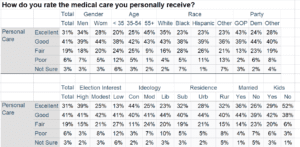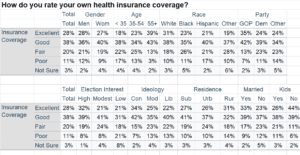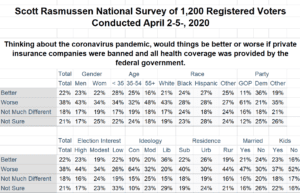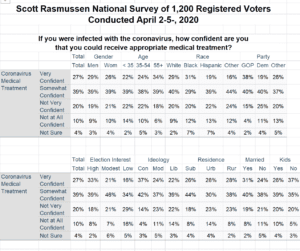As America begins to reopen society, individual Americans have come to recognize that there are significant health risks involved in continuing the lockdowns associated with the coronavirus.
Polling I conducted last week (April 24-26, 2020) for FreedomWorks shows that 61% of voters nationwide are concerned about the health risks associated with prolonged isolation. An even larger share of voters — 73% — say that it’s important for their own mental well-being to be able to see people face-to-face again.
At one level, this is just an expression of common sense. Human beings are social creatures who suffer from a lack of social interaction. However, much of the awareness comes from firsthand experience.
· Thirty-three percent have close friends or family members who have been severely depressed during the lockdown.
· Twenty-three percent know of people close to them who have been drinking too much during the lockdown.
· Thirty-five percent have personally put on weight or experienced health-related problems associated with the stay-at-home orders.
In other words, voters recognize there are no easy answers. It’s not a question of stay home to stay safe or go out and get sick. There are difficult trade-offs involved and no options are completely safe.
The dynamics of these risks change over time. When conducted for a very short period of time, lockdowns and social isolation present very low levels of health risk. The longer the isolation, however, the higher the risk.
As a result, locking down society was clearly the lower-risk alternative when the pandemic began. Voters recognized that reality by strongly backing many government actions to shut down both travel and social interaction. Looking back on it now, 72% of voters continue to believe the aggressive government actions prevented the spread of the coronavirus and saved lives. Just 14% disagree.
Not only that, few believe the actions should have been taken only in large cities with severe outbreaks. Sixty-nine percent (69%) believe the lockdowns were appropriate throughout the country. In our highly polarized political era, it’s astounding to find 7 out of 10 voters agreeing on any type of government action.
But now, after experiencing and taking into account the risks of extended social isolation, voters are reevaluating the trade-offs. While 51% think it’s appropriate to continue the lockdowns, 47% think it’s time to either ease the restrictions (36%) or end the lockdowns entirely (11%). The FreedomWorks data shows that some of the differences of opinion are actually based upon the different realities that voters are experiencing. Most urban voters (58%) want to continue the lockdowns while most rural voters (55%) think it’s time to ease restrictions or end the lockdowns.
Looking a bit further down the road, people see the risks of continued isolation growing. Today 36% believe that continuing the lockdowns poses greater health risks than easing restrictions. Another 18% believe that will be the case if lockdowns continue for 60 more days.
In other words, a combined 54% of the nation’s voters believe that 60 more days of lockdowns will present a greater health risk than easing lockdown restrictions. At the other extreme, just 21% believe that continuing the lockdowns for another couple of months will be the safer approach.
As voters have experienced and considered the health risks associated with social isolation and lockdowns, scientists have been gathering additional information about the coronavirus itself. The evidence indicates that voters are factoring this data into their understanding of the trade-offs involved.
Specifically, 76% of voters are aware that recent data has shown that far more people have been infected with the coronavirus than previously thought. Voter thoughts about when and how to reopen society are being made with awareness that COVID-19 is extremely contagious.
At the same time, just 44% are aware that the latest data shows that people who get the coronavirus are less likely to die than previously thought. That decline weighs heavily on the trade-offs involved. When people believe the fatality rate of the contagion is higher and the costs of lockdowns are lower, they are more likely to embrace the lockdowns. But as the costs of social isolation increases and the data shows the fatality rate to be lower, the equation shifts.
Not surprisingly, therefore, those who are aware of the latest scientific data favor easing lockdown restrictions by a 66% to 33% margin. Those who mistakenly believe the fatality rate has not fallen favor continuing the lockdowns by a 71% to 28% margin.
For those who believe in America’s commitment to self-governance, this is encouraging news. Even in the midst of a crisis like the coronavirus pandemic, individual Americans are weighing the difficult trade-offs based upon the underlying facts.
In the coming months, we will learn many more facts as individual cities and states take different approaches to reopening society. The choices will be difficult. Some approaches will work better than others and some will be more appropriate in one part of the country rather than others. As individual Americans consider it all, they will swiftly guide the nation towards the best practices for safely reopening society.






